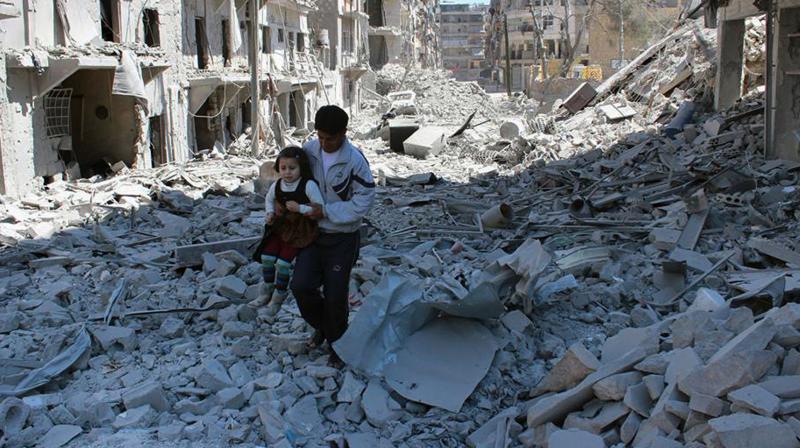Colonial powers are historically held responsible for tensions and conflicts straining the Middle East in pre-WWII times, with approximately 60 percent of the regional map having been occupied by foreign forces.
After the Second World War, colonialism was mostly driven out of the region—however, contrary to assumptions, the Middle East transformed into a hotbed for exasperating disputes and strife. Blame, nevertheless, is still wrongly directed against the “Cold War” and ongoing geopolitical tensions between powers in the Eastern Bloc (the Soviet Union and its satellite states) and powers in the Western Bloc (the United States, its NATO allies and others).
Reasons were redirected towards political vacuum after the Soviet Union collapsed in the early 90s, leaving behind only one superpower. New wars emerged in Afghanistan, Somalia and Iraq, and crises flared up in Egypt, Algeria, southern Yemen and Eritrea.
Moscow’s return to the international arena then ended the so-called political vacuum and removed the single pole status quo.
Wars spread, becoming fiercer and with an impact larger than any on record and red lines were overstepped.
It could be said that death, harm, displacement and destruction caused by recent civil wars have outdone any inflicted by wars waged in the past five decades combined, and the tragedy continues.
Witnessing that the region has only descended into more chaos and havoc, it cannot be assumed that international spheres of influence are solely accountable. The region in and of itself is highly volatile and susceptible to wars breaking out.
Conflict in Eastern Europe ceased as a result of an agreement brokered between the two key Cold War camps. After the Soviet camp was no longer, the situation was under control and manageable. The dissolution of Czechoslovakia took place and Yugoslavia was broken up, all of which happened by virtue of European cooperation.
All of the above was preceded by Southeast Asian arrangements made after the United States’ defeat in Vietnam when the whole region was reshaped, including Indonesia and Malaysia, and support being given to South Korea. Even a unified Vietnam later began to cooperate with the West once again.
What does it take to achieve stability in the Middle East? The region still presents a danger not only to itself, but also the world!
There is a widely-held conviction that has been around since the 80s on Iran being the prime source for regional tension — a reservoir responsible for exporting chaos –followed by the regime of Saddam Hussein in Iraq.
Saddam’s dictatorship was overthrown, so was Libya’s notorious despot Muammar Gaddafi. The last chaos-wielder remaining was Iran.
Successive US administrations sought to reassure Iran that, despite differences, they only want to contain Tehran hostility and its export of terrorism and fine tune its behavior rather than introduce true political change, like what happened in Iraq and Libya.
What if the world succeeded in forcing the Iranian regime to change its behavior and end its aggression? Or have it changed conclusively?
There is no doubt that the region’s prospects at lasting and comprehensive peace would be greater. The main artery pumping funds, hosting and exporting chaos and terrorism throughout decades will be cut off. It could be that the Middle East will live out its first chance in its modern history without any unrest.
Most of the chaos witnessed today is either directly or indirectly linked to Iran, such as Hezbollah in Lebanon, Hamas in Gaza, Iraq’s extremist militias, Houthis in Yemen, and other Iran-aligned groups in Afghanistan, Pakistan and Bahrain.
Regional and international powers must first unanimously identify Iran’s regime as the leading source of regional chaos and war. Subsequently, it is imperative to note that dealing with the headspring of evil takes precedence over vainly chasing off Tehran proxies.
A major component of the clerical regime’s success is the effective exploitation of regional disputes to its benefits—at some instances claiming to defend Islamic causes and at others backing “humanitarian” issues. Iran has repeatedly failed to justify its aggressions and earned its title as the most hated state by the people.
Tehran is still playing on the chords of international conflict in the region, allied with Russia, as well as extorting China.
Fortunately, regional states are aware and familiar with the problem at hand. They do not wish to resurrect the spheres of influence scenario.
Regional countries are saving no effort in trying to persuade Moscow not to be dragged behind the Tehran regime into a game of brutal geopolitics outlined by influence and conflicts of interests. A multi-axis political atmosphere would pit Washington and Gulf states against a Moscow allied with Iran.
Should Moscow be persuaded, axes that would inevitably spin out of control will be overcome and Iranian hostility put to an end.
Without alliances, Tehran’s futile play, which only harmed Iranian people and the people of the region, will be put to rest.
